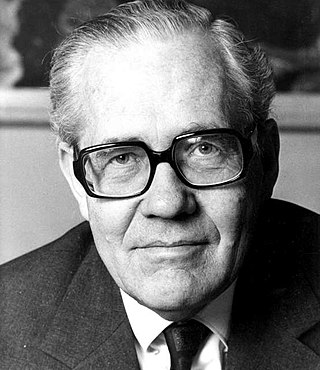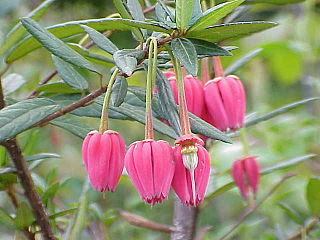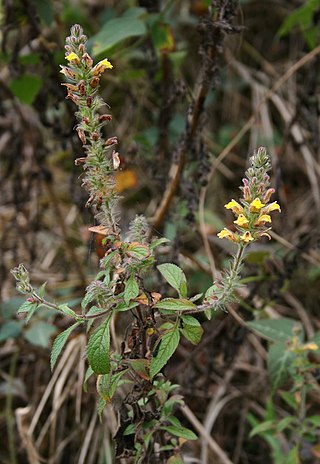
Gregor Johann MendelOSA was an Austrian-Czech biologist, meteorologist, mathematician, Augustinian friar and abbot of St. Thomas' Abbey in Brno (Brünn), Margraviate of Moravia. Mendel was born in a German-speaking family in the Silesian part of the Austrian Empire and gained posthumous recognition as the founder of the modern science of genetics. Though farmers had known for millennia that crossbreeding of animals and plants could favor certain desirable traits, Mendel's pea plant experiments conducted between 1856 and 1863 established many of the rules of heredity, now referred to as the laws of Mendelian inheritance.

The Lamiaceae or Labiatae are a family of flowering plants commonly known as the mint, deadnettle or sage family. Many of the plants are aromatic in all parts and include widely used culinary herbs like basil, mint, rosemary, sage, savory, marjoram, oregano, hyssop, thyme, lavender, and perilla, as well as other medicinal herbs such as catnip, salvia, bee balm, wild dagga, and oriental motherwort. Some species are shrubs, trees, or, rarely, vines. Many members of the family are widely cultivated, not only for their aromatic qualities, but also their ease of cultivation, since they are readily propagated by stem cuttings. Besides those grown for their edible leaves, some are grown for decorative foliage. Others are grown for seed, such as Salvia hispanica (chia), or for their edible tubers, such as Plectranthus edulis, Plectranthus esculentus, Plectranthus rotundifolius, and Stachys affinis. Many are also grown ornamentally, notably coleus, Plectranthus, and many Salvia species and hybrids.
Population is the term typically used to refer to the number of people in a single area. Governments conduct a census to quantify the size of a resident population within a given jurisdiction. The term is also applied to non-human animals, microorganisms, and plants, and has specific uses within such fields as ecology and genetics.

Gentianaceae is a family of flowering plants of 103 genera and about 1600 species.

Poul Hartling was a Danish politician and diplomat. He was leader of Venstre from 1965 to 1977, and served as Prime Minister of Denmark from 1973 to 1975. Prior to that, he served as foreign minister from 1968 to 1971 under Hilmar Baunsgaard. From 1978 to 1985, he served as the United Nations High Commissioner for Refugees.

Elaeocarpaceae is a family of flowering plants. The family contains approximately 615 species of trees and shrubs in 12 genera. The largest genera are Elaeocarpus, with about 350 species, and Sloanea, with about 120.

Bruce Hartling Mann is an American legal scholar who is the Carl F. Schipper, Jr. Professor of Law at Harvard Law School, and husband of U.S. Senator Elizabeth Warren. A legal historian, his research focuses on the relationship among legal, social, and economic change in early United States. He began teaching at Harvard Law School in 2006, after being the Leon Meltzer Professor of Law and Professor of History at the University of Pennsylvania Law School.

Vítězslava Kaprálová was a Czech composer and conductor of 20th-century classical music.

Hometime is an American PBS home improvement television program. It aired from November 1, 1986, to January 30, 2016. Hometime was broadcast on public television and in syndication.

Lindenbergia is a genus of herbaceous plants in the order Lamiales and in the broomrape family Orobanchaceae. It is one of the few genera of the family which are not parasitic. It contains about 15 species found from northeast Africa across Asia to the Philippines, and is most abundant in India.

Arthur L. Horwich is an American biologist and Sterling Professor of Genetics and Pediatrics at the Yale School of Medicine. Horwich has also been a Howard Hughes Medical Institute investigator since 1990. His research into protein folding uncovered the action of chaperonins, protein complexes that assist the folding of other proteins; Horwich first published this work in 1989.

Karl Hartl was an Austrian film director.
Franz-Ulrich Hartl is a German biochemist and the current Executive Director of the Max Planck Institute of Biochemistry. He is known for his pioneering work in chaperone-mediated protein folding.

Peter Härtling was a German writer, poet, publisher and journalist. He received the Order of Merit of the Federal Republic of Germany for his major contribution to German literature.

The Prince of Arcadia is a 1932 Austrian-German romance film directed by Karl Hartl and starring Willi Forst, Liane Haid and Hedwig Bleibtreu. It was shot at the Sievering Studios of Sascha Film in Vienna with sets designed by the art director Hans Ledersteger. Location filming took place at Ragusa in Sicily. It premiered on 18 May 1932.

Our Nixon is an all-archival documentary providing a view of the Nixon presidency through the use of Super-8 format home movies filmed by top Nixon aides H.R. Haldeman, Dwight Chapin and John Ehrlichman, combined with other historical material such as interviews, oral histories and news clips. It was directed by Penny Lane.

Nancy J. Hartling is a Canadian Senator from Moncton, New Brunswick. She was Executive Director of Support to Single Parents Inc., as well as a founding member of St. James Court Inc., a non-profit housing complex which provides single parents with affordable housing. On October 27, 2016, Hartling was named to the Senate of Canada by Prime Minister Justin Trudeau to sit as an independent and assumed office on November 10, 2016.
Daniel L. Hartl is the Higgins Professor of Biology in the Department of Organismic and Evolutionary Biology at Harvard University. He is also a principal investigator at the Hartl Laboratory at Harvard University. His research interests are focused on evolutionary genomics, molecular evolution, and population genetics.

Tozzia is a monotypic genus of flowering plants within the broomrape family Orobanchaceae. It contains a unique species, Tozzia alpina.

Zanthoxyloideae is a subfamily of the family Rutaceae.
















